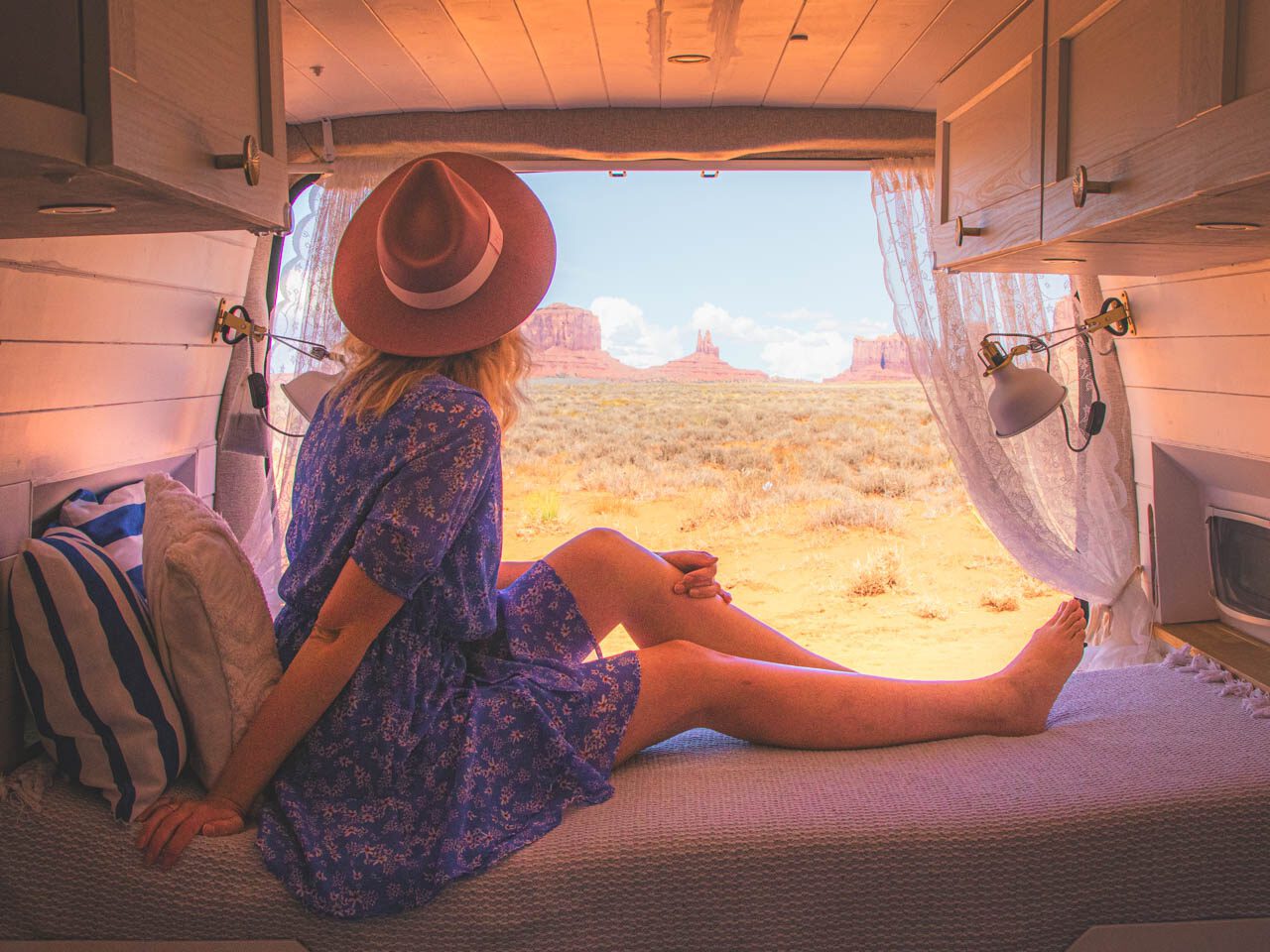Monument Valley is one of those places you can’t mistake for anywhere else.
Red spires rise straight from the desert, light moves across the rocks like across a theater stage, and the horizon is so wide it takes your breath away.
Though many people associate this place with movies and postcards, Monument Valley holds much more than just beautiful frames.
It’s a space deeply rooted in culture and history – land that has belonged to the Navajo Nation for generations and still tells their story.
In this guide, you’ll find my favorite spots and the most interesting Monument Valley attractions, plus practical tips to help you plan your visit so you can truly feel this unique landscape.
I’ll also share some cultural context, because understanding this history adds a completely different depth to visits to Monument Valley.
Ready for a desert adventure that stays with you for a long time? Let’s go.
Planning Your USA Trip – Start Here
If you’re just getting started with planning your American adventure, these guides will help you understand the country, pick a region, and build an itinerary:
What Is Monument Valley
Monument Valley is one of the most recognizable landscapes in the entire American West.
Massive red rock formations rise straight from the desert floor – some reaching up to 985 feet above the valley floor – creating a view that looks like a living postcard.
The valley sits on the Arizona-Utah border, within the Navajo Nation Reservation, land that has belonged to them for generations. It’s their culture, traditions, and stories that give this place a depth you won’t see at first glance.
Though many associate Monument Valley with iconic westerns and movie frames, in reality it’s much more than just a place “from the screen.”
It’s a space best experienced slowly – listening to the silence, watching light move across the rocks, and feeling how the vastness of this landscape does its work.
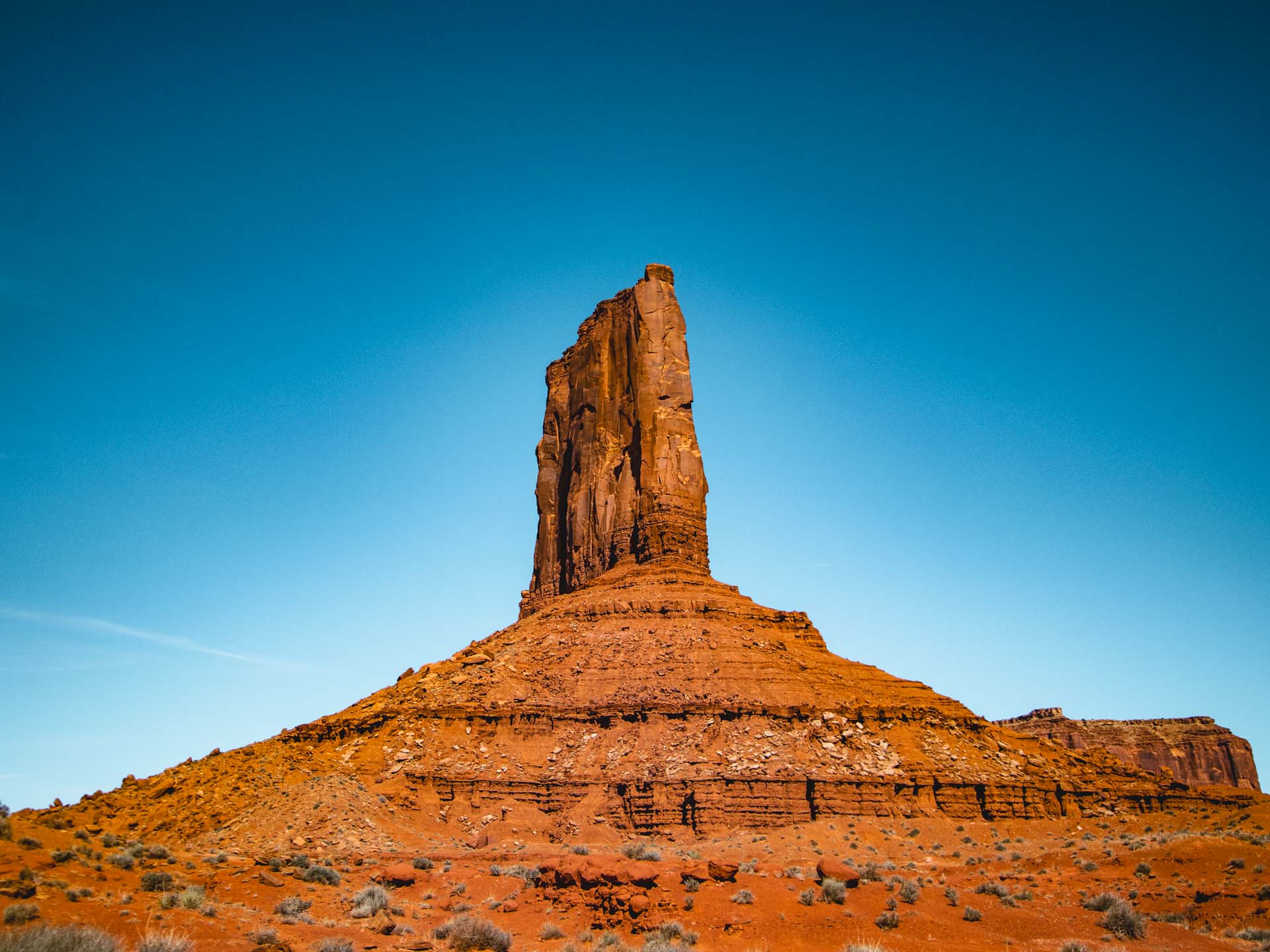
The Navajo Nation: A Place That Lives History and Tradition
Monument Valley isn’t just spectacular landscapes.
It’s primarily the land of the Navajo Nation – a community that has lived in harmony with this desert world for generations and gives it meaning you won’t see on postcards.
The Navajo have a unique status in the USA – they function as a “dependent nation,” meaning a unit with significant autonomy.
This means they conduct their affairs on their own terms: with their own government, president, tribal council, and justice system that beautifully combines contemporary law with ancient traditions.
Their approach to law stems from the philosophy of hozho – balance, harmony, and living in accord with nature.
Conflicts are resolved here primarily through conversation, understanding, and seeking common ground, rather than through confrontation.
The Navajo Nation also has its own education system that combines standard school curriculum with teaching their language, culture, and traditions.
Thanks to this, younger generations grow up with contact to both modernity and their own roots.
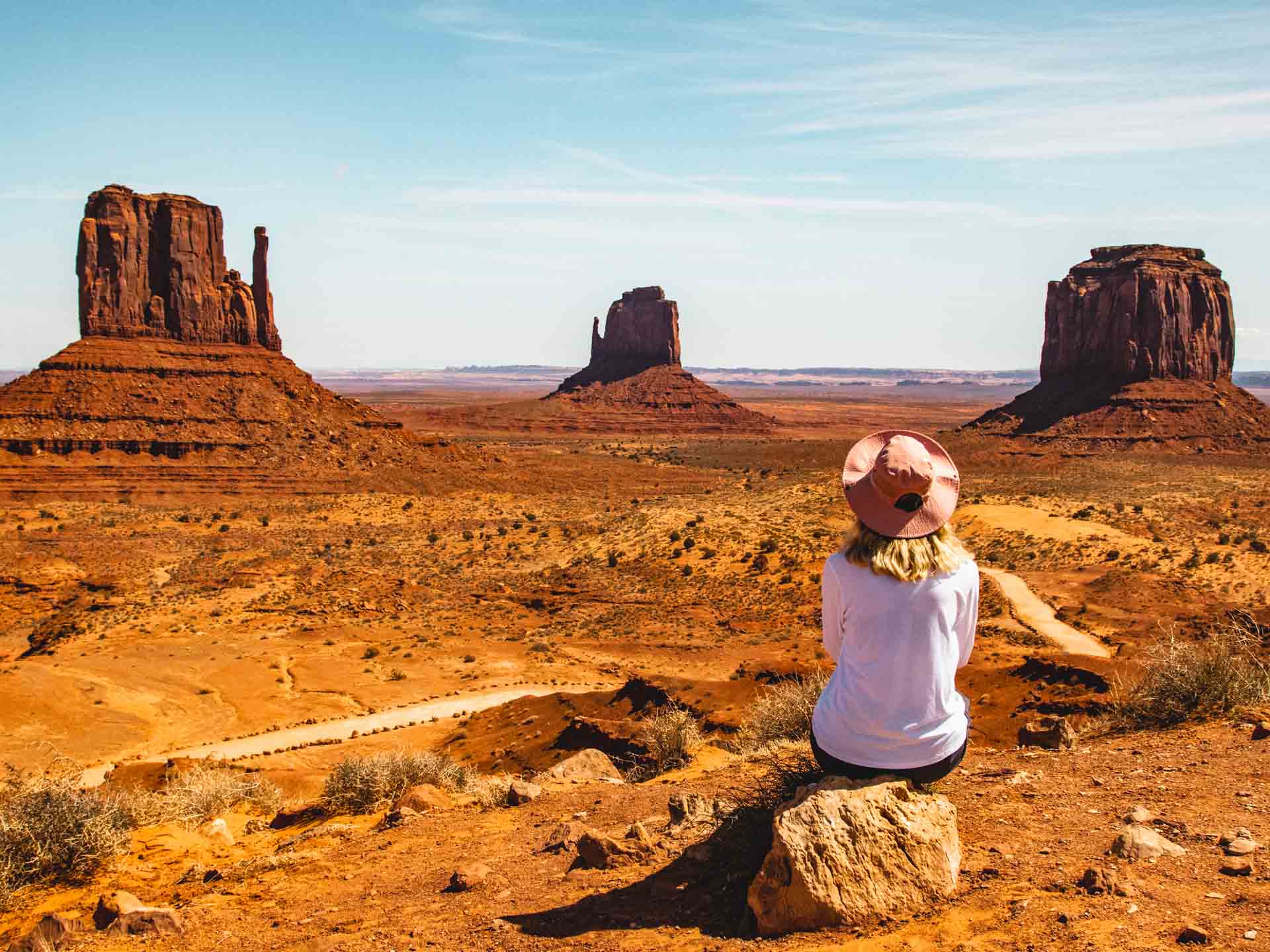
The Cultural Heart of Monument Valley
Monument Valley is much more than just a beautiful landscape to the Navajo Nation.
It’s sacred land where each rock formation has its own story and place in their mythology.
One of the most famous symbols is The Mittens – two slender rock “mittens” that according to stories represent the hands of the First People, rising from the earth like guardians of the valley.
For the Navajo, these aren’t just rocks, but living reminders of the world’s beginning and the connection with nature.
It’s also said that Monument Valley has a gentle, positive energy that’s conducive to quieting the mind and spiritual renewal.
This is a place where the desert can truly calm your thoughts.
The valley also has deep historical significance – it’s connected to the dramatic period of the Long Walk in the 1860s, when the Navajo were forcibly removed from their lands.
The Navajo presence in Monument Valley today is thus also a symbol of survival and return home.
Despite enormous popularity and daily tourist visits, Monument Valley is still a real home for many Navajo families who live here according to their traditions – herding sheep, creating handicrafts, speaking the Diné language, and preserving the memory of their ancestors.
It’s precisely this mixture: mythology, history, spirituality, and daily life that makes Monument Valley a place that feels… different.
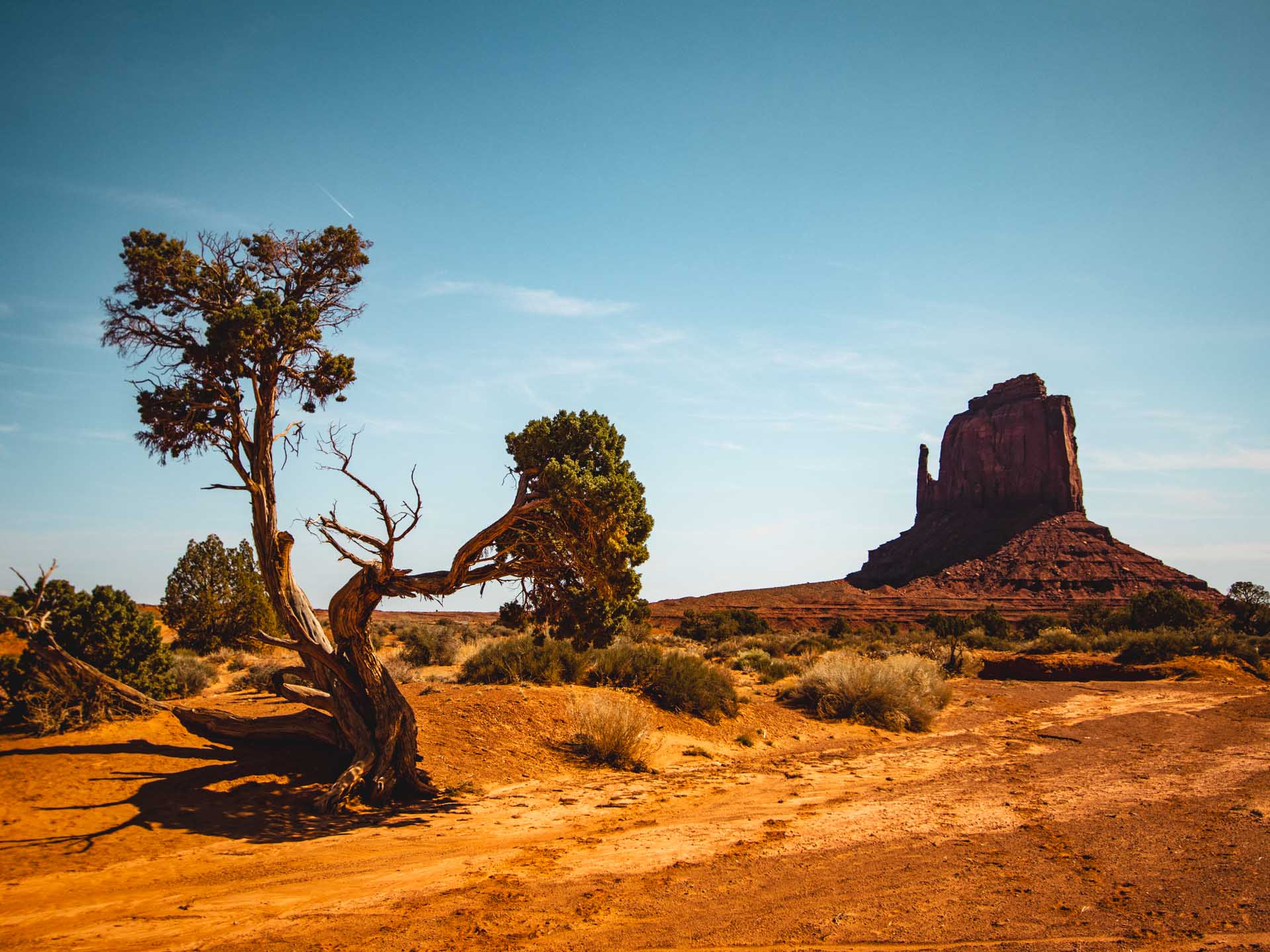
Best Things to Do in Monument Valley
Scenic Drive
If you want to really feel Monument Valley, start with the most famous route – the 17-mile (about 27 km) Scenic Drive.
It’s a loop that leads through the very center of the valley and lets you see all the iconic rock formations up close.
Driving it slowly, stopping at viewpoints, and letting the desert “work,” you’ll feel why this place is so special.
The route has several stops you can’t miss:
- North Window: A natural “window” between rocks. It frames the valley view in a way that looks like a ready-made photograph – especially in the soft afternoon light.
- The Mittens and Merrick Butte: Two characteristic formations shaped like giant mittens rising from the earth. This is usually the first frame you’ll see – and it’s completely deservedly become the symbol of Monument Valley.
- John Ford’s Point: A place named after the western director who showed the world the beauty of this valley. The panorama from this point is wide, peaceful, and absolutely cinematic.
- Three Sisters: Three slender spires looking like nuns standing next to each other. They look most beautiful in the morning when light emphasizes their shape.
- Totem Pole: A tall, thin formation that looks like a stone totem rising from the desert. It’s one of the most photogenic structures in the entire valley.
- Artist’s Point: A place photographers love most. The Monument Valley panorama stretches here wide like a painted landscape – and sunsets can be truly spectacular.
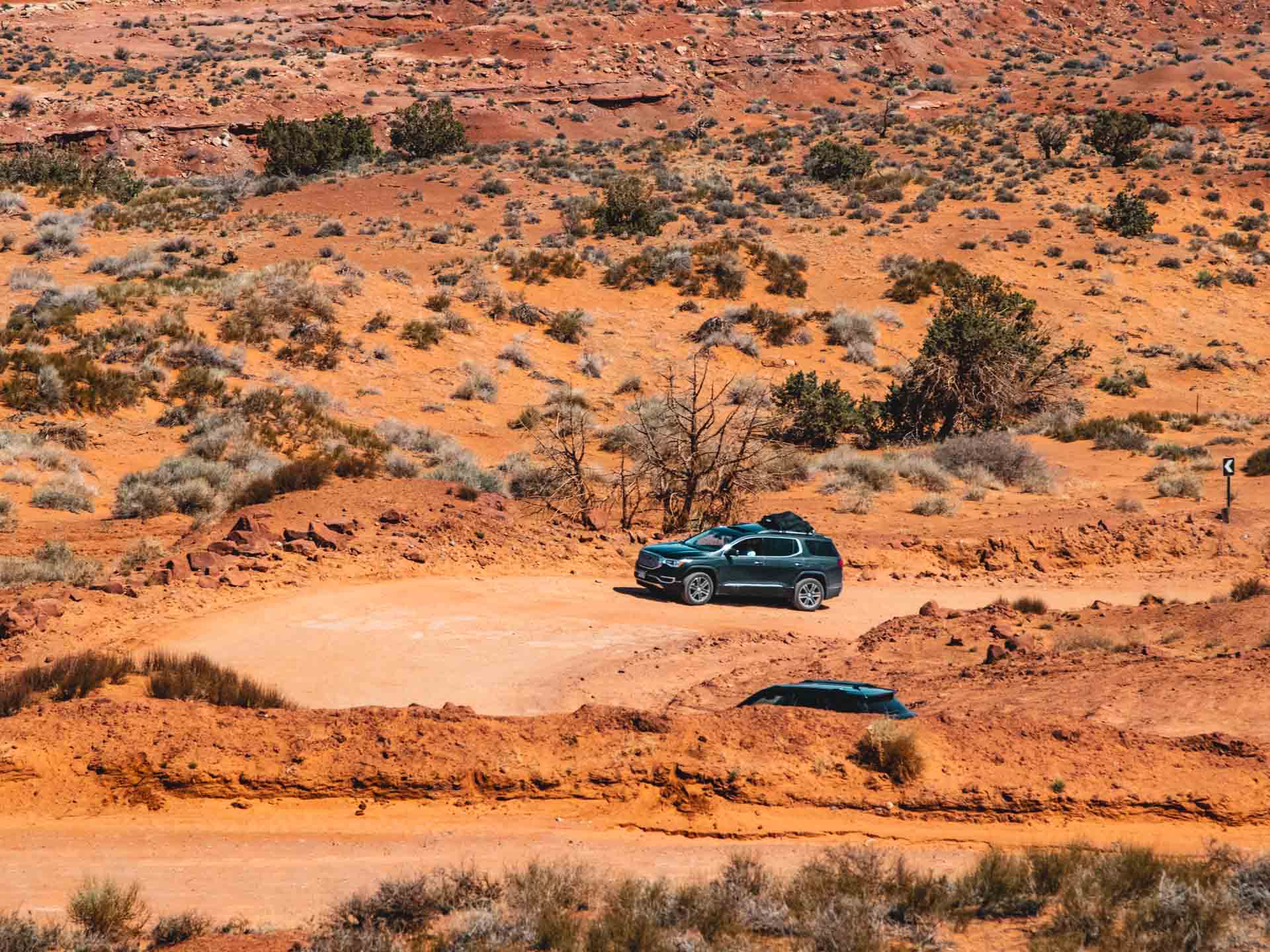
What to Know Before Setting Out on Scenic Drive
- The road is unpaved – bumpy in places, but most regular cars handle it without problems. A 4×4 vehicle isn’t necessary.
- Entry only for standard passenger cars. Large SUVs, RVs, and motorcycles aren’t allowed on the route to protect the valley’s delicate surface.
- Drive slowly – this isn’t a route for “checking off,” but for looking. Stop only in designated places – the desert ecosystem is fragile and easily damaged.
- You can drive the route yourself or choose a tour with a Navajo guide, which allows access to places unavailable without a guide and lets you hear stories you won’t find in guidebooks.
- Reserve 2-4 hours for Scenic Drive, depending on how many viewpoints you want to see and how often you stop for photos.
- The route only operates during park hours. Last entry is usually about 2.5 hours before closing, so it’s worth planning your visit earlier in the day.
Forrest Gump Point
This is exactly where, on the long straight road US-163, Forrest Gump stopped and announced he was “tired.” Since then, this place has become one of the most iconic frames of the American West.
The viewpoint offers a panoramic perspective of Monument Valley, and the shot of the road stretching before you looks exactly like in the movie – as if leading you straight into the heart of the red desert.
This place is outside the park boundaries, so you don’t need to pay any entry fee.
It’s most beautiful here at sunrise, when the first light of day softly emphasizes the shapes of rocks and makes the entire valley look like something from another world.
If you want to calmly take a photo without crowds – come early.
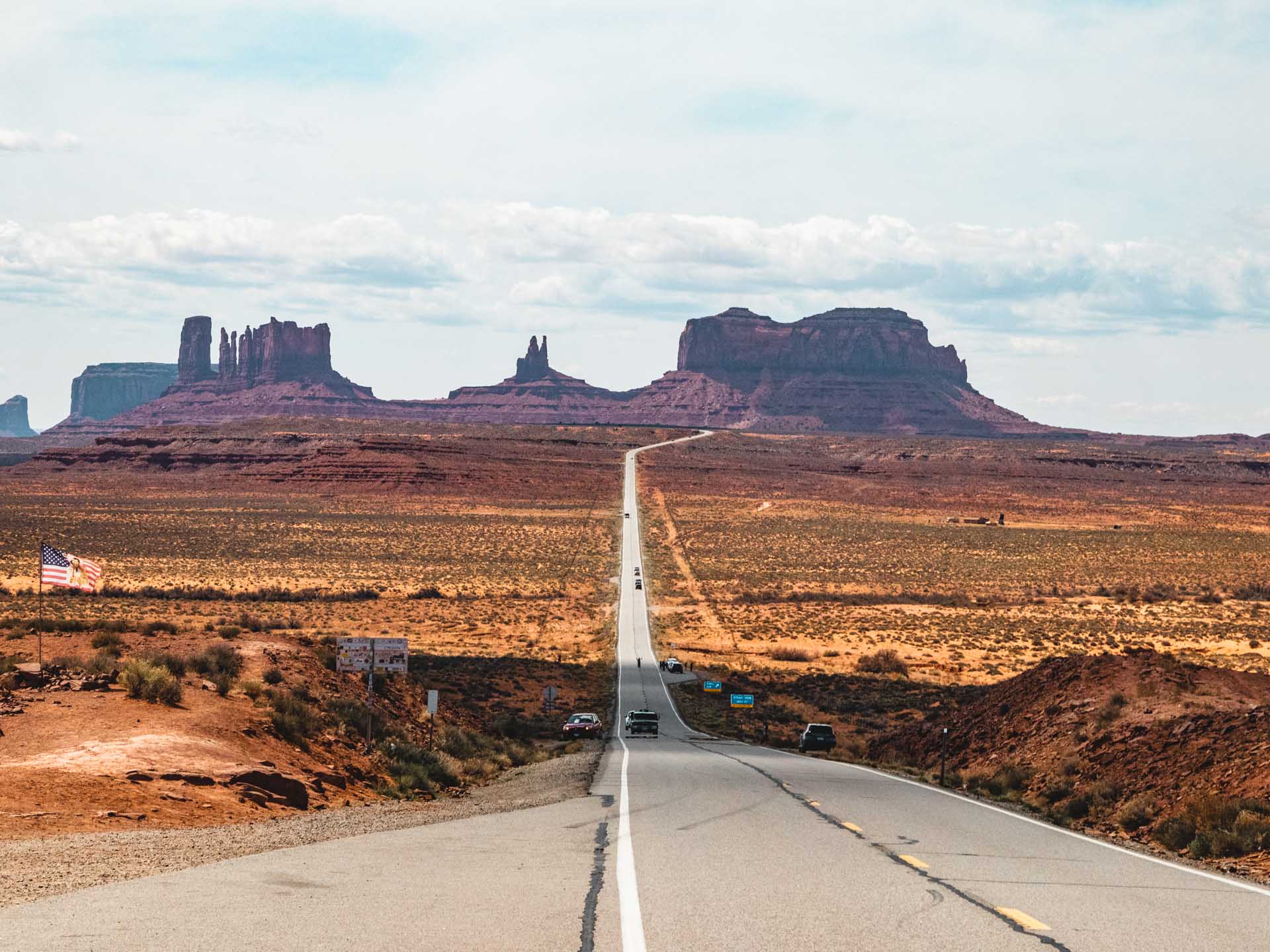
Hiking in Monument Valley
If you want to feel Monument Valley really up close, head out on Wildcat Trail – the only trail you can hike independently, without a guide.
It’s 5.1 km (3.2 miles) of peaceful walking around one of the most famous formations – West Mitten Butte.
Here’s what you should know:
- Difficulty: Moderate. The trail is mostly flat, though the sandy surface can be tough. The most demanding moments are the descent into the valley at the beginning and the climb back at the end.
- Time: Reserve 2-3 hours for yourself, especially if you like to pause, take photos, and simply absorb this landscape.
- Views: Wildcat Trail leads in a wide loop around West Mitten. At certain moments you’ll be standing literally between monumental rocks, which gives a completely different perspective than viewing the valley from viewpoints.
- Best time: Choose early morning or late afternoon – it’s cooler then, and light softly draws the shapes of rocks. Avoid midday, especially in summer. At the bottom of the valley it can be up to 10°C warmer than at the top, which in dry desert weather quickly exhausts you.
- Preparation: Bring lots of water, snacks, a hat, sunscreen, and comfortable shoes. It’s not a long trail, but the desert demands respect.
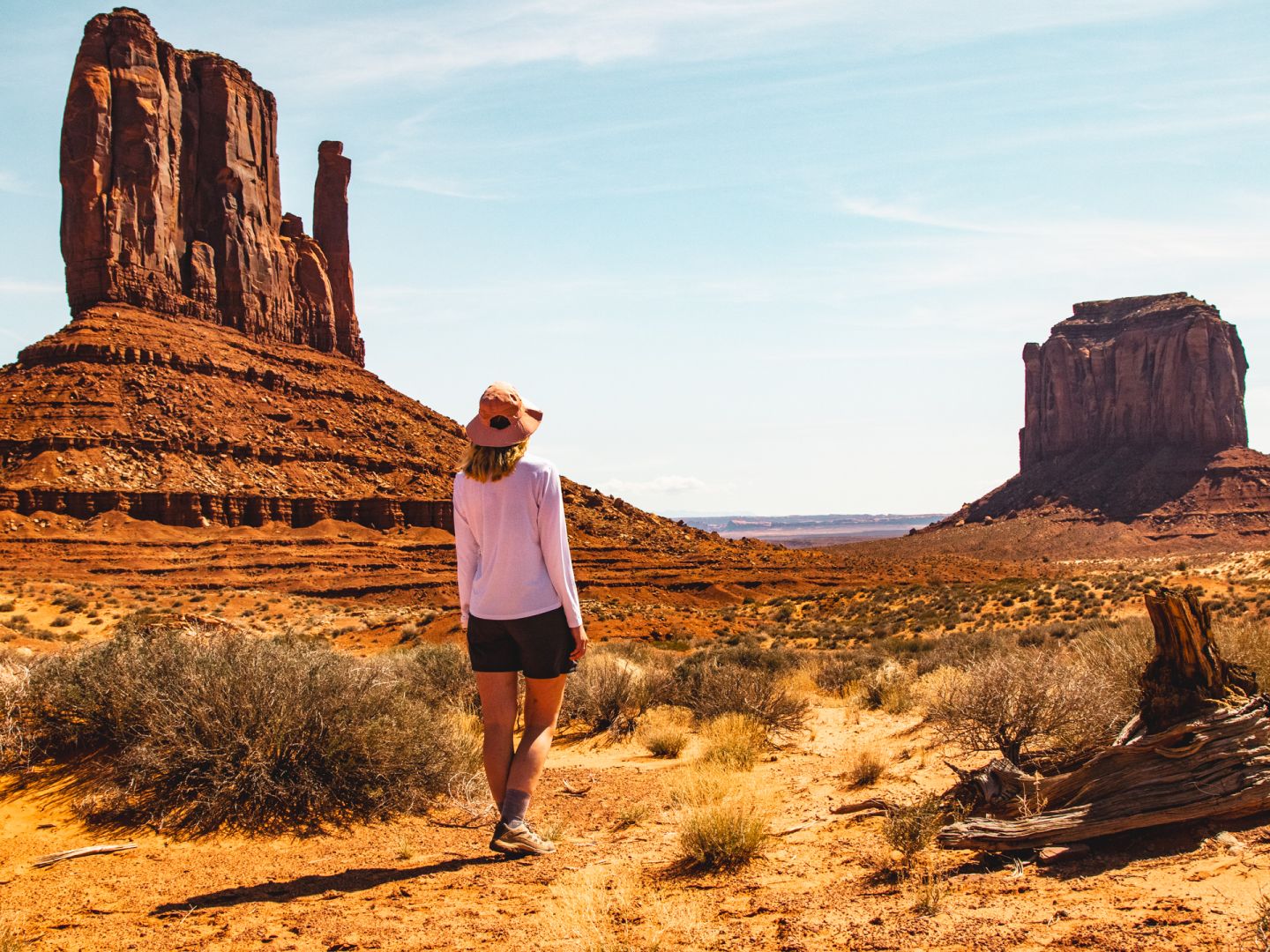
Watching the Sunrise and Sunset
Watching the sunrise or sunset over Monument Valley is one of those experiences that stays in your head for years. Light softly moves across the rocks, and the entire valley looks like a scene from a movie, only much more real.
Best Places for Golden Hour
- Artist’s Point – wide postcard view, magical at sunset.
- Forrest Gump Point – iconic perspective of the entire valley, best in the morning.
- The View Hotel terrace – the most classic panorama, ideal at sunrise.
A Few Tips for Photographers
- The most beautiful light appears right after sunrise and just before sunset. Colors are deep then, and long shadows emphasize the shapes of rocks.
- Look for natural leading lines – rock ridges, roads, plants – that will lead the eye through the frame.
- Desert plants work great as foreground and add depth to photos.
- Monument Valley begs for panoramas. You can take a series of photos and combine them later, or use panorama mode on your phone.
- If you’re staying overnight nearby, definitely try to capture the starry sky. The valley has exceptionally dark skies, great for astrophotography.
- Beyond big shots, also stop for details – rock textures, wind marks in the sand, light reflecting in the red stone.
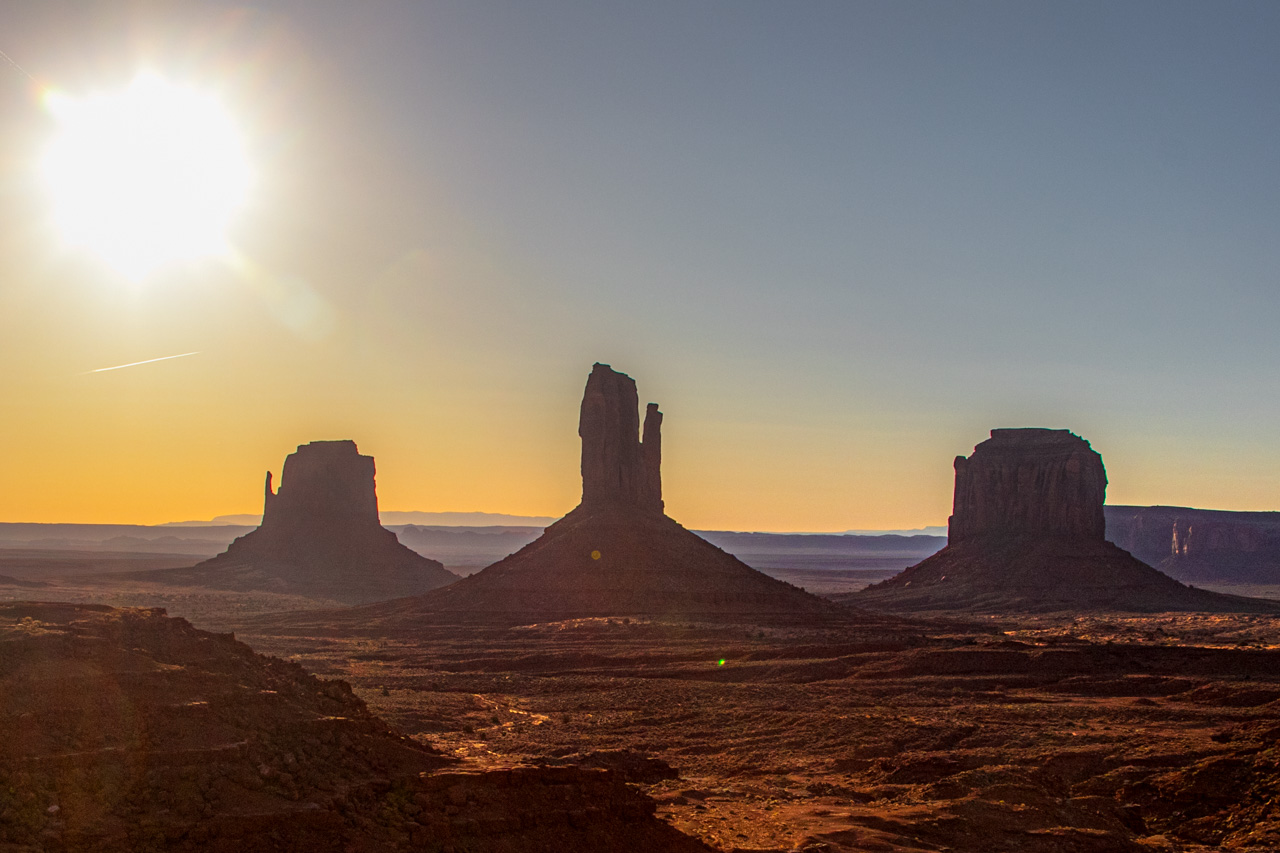
Guided Tours
If you want to feel Monument Valley even more fully – hear its stories, legends, and see it through the eyes of people who truly live here – it’s definitely worth going on a guided tour.
Most interesting options:
- Jeep rides: Allow you to reach places inaccessible to regular cars, like Mystery Valley or Teardrop Arch. Ideal if you want to see wild, less frequented corners.
- Horseback rides: A more intimate, traditional way of touring the valley. Guides often share stories passed down in their families for generations.
- Photo tours: Lead to the best viewpoints at ideal times of day. Great if you want to return with truly exceptional photos.
- Cultural tours: Focused on Navajo traditions and daily life – often include a visit to a traditional hogan, stories about crafts, and demonstrations of how handmade items are created.
- Airplane tours: If you want to see the valley from a bird’s perspective – it’s an experience that stays in your memory for a long time. Rock formations look from above like fairy tale figures rising from the desert.
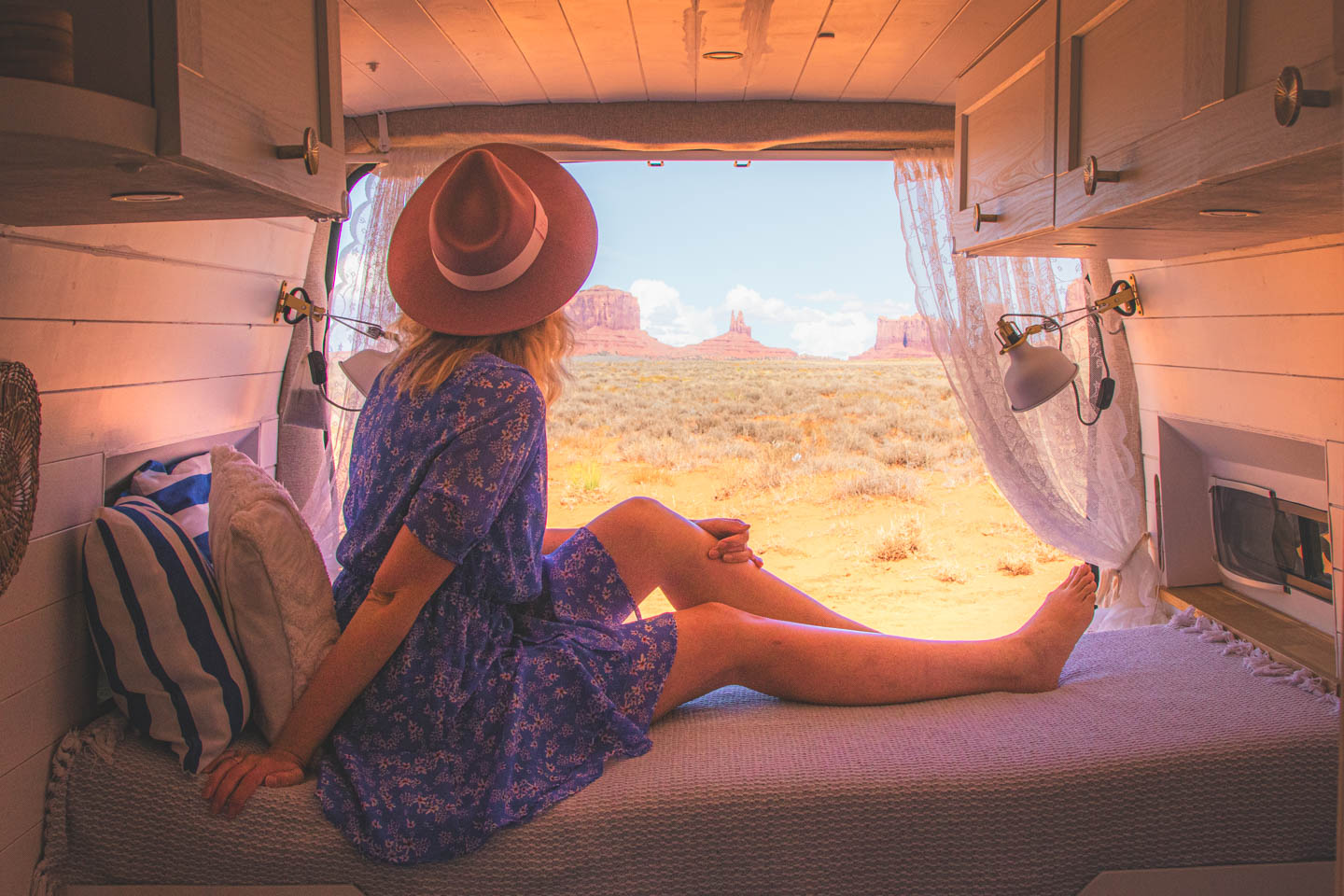
Discovering the Southwest USA and looking for more hidden treasures?
I share my best discoveries from every trip through Arizona, Utah, and California – from spectacular trails to places where time stands still.
Bonus for new subscribers: Ultimate Utah Budget Travel Planner + my personal Southwest road trip route with exact costs 📍
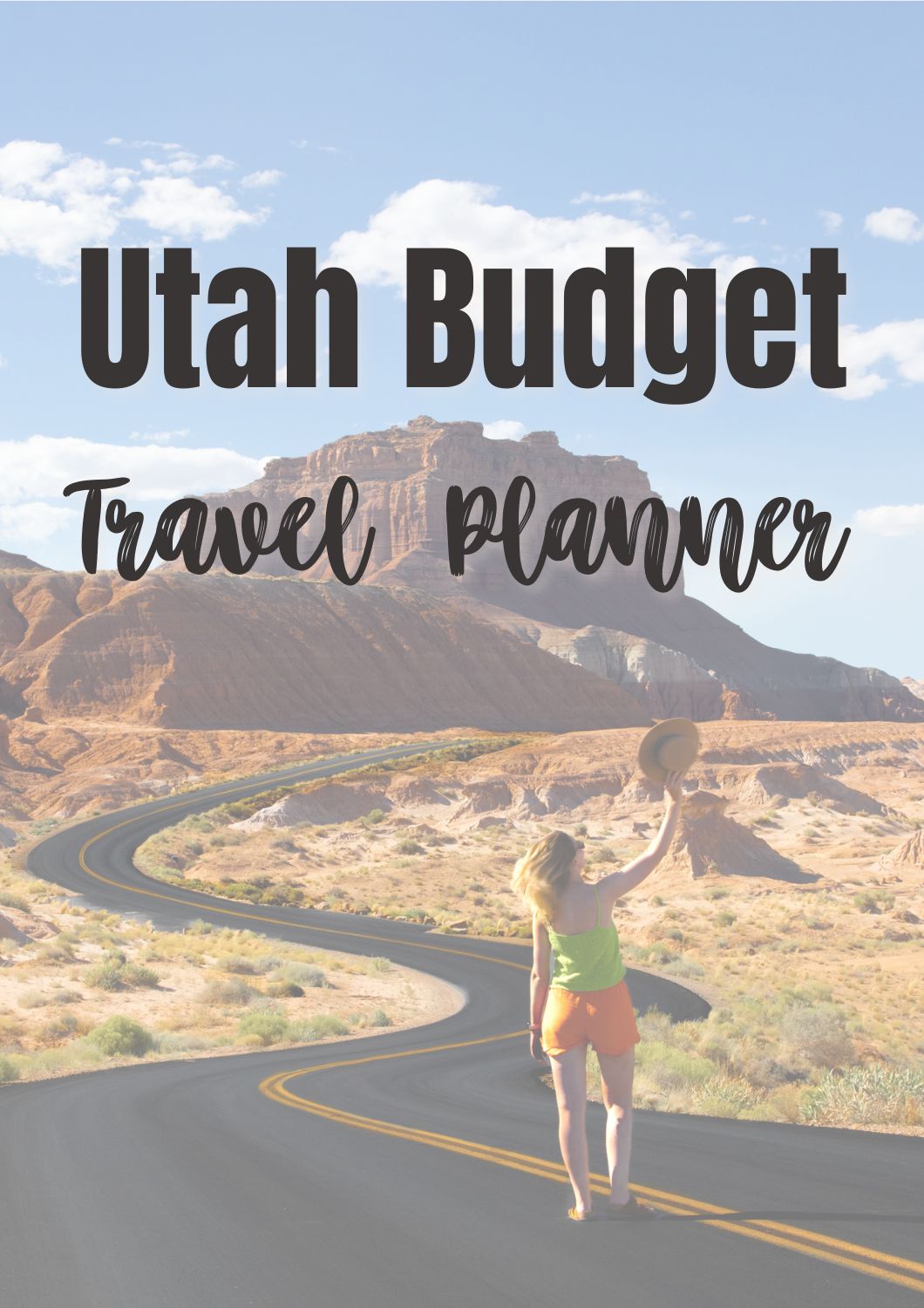
Helpful Tips
Best Time to Visit Monument Valley
Monument Valley is open year-round, but which time will be best depends on what experience you’re seeking.
Spring (March-May)
In my opinion, this is the most beautiful time in the valley. The temperature is pleasant, light is soft, and rock colors look incredible. Perfect moment for hikes and long drives on the scenic drive.
Fall (September-November)
Equally great time. Days are stable, warm but not hot. Sunsets can be totally magical then.
Summer (June-August)
It can be really hot – temperatures often exceed 100°F. This is also peak season, so prepare for more tourists. If it’s the only time you can come – it’s doable, but head out at dawn and avoid midday.
Winter (December-February)
Cooler, sometimes it snows, but the valley in winter aura has its own unique atmosphere. Definitely a quieter time to visit.
Best choice?
If you can – go for spring or fall. That’s when Monument Valley shows itself at its most beautiful. (March-May) and fall (September-November) are the best times to go!
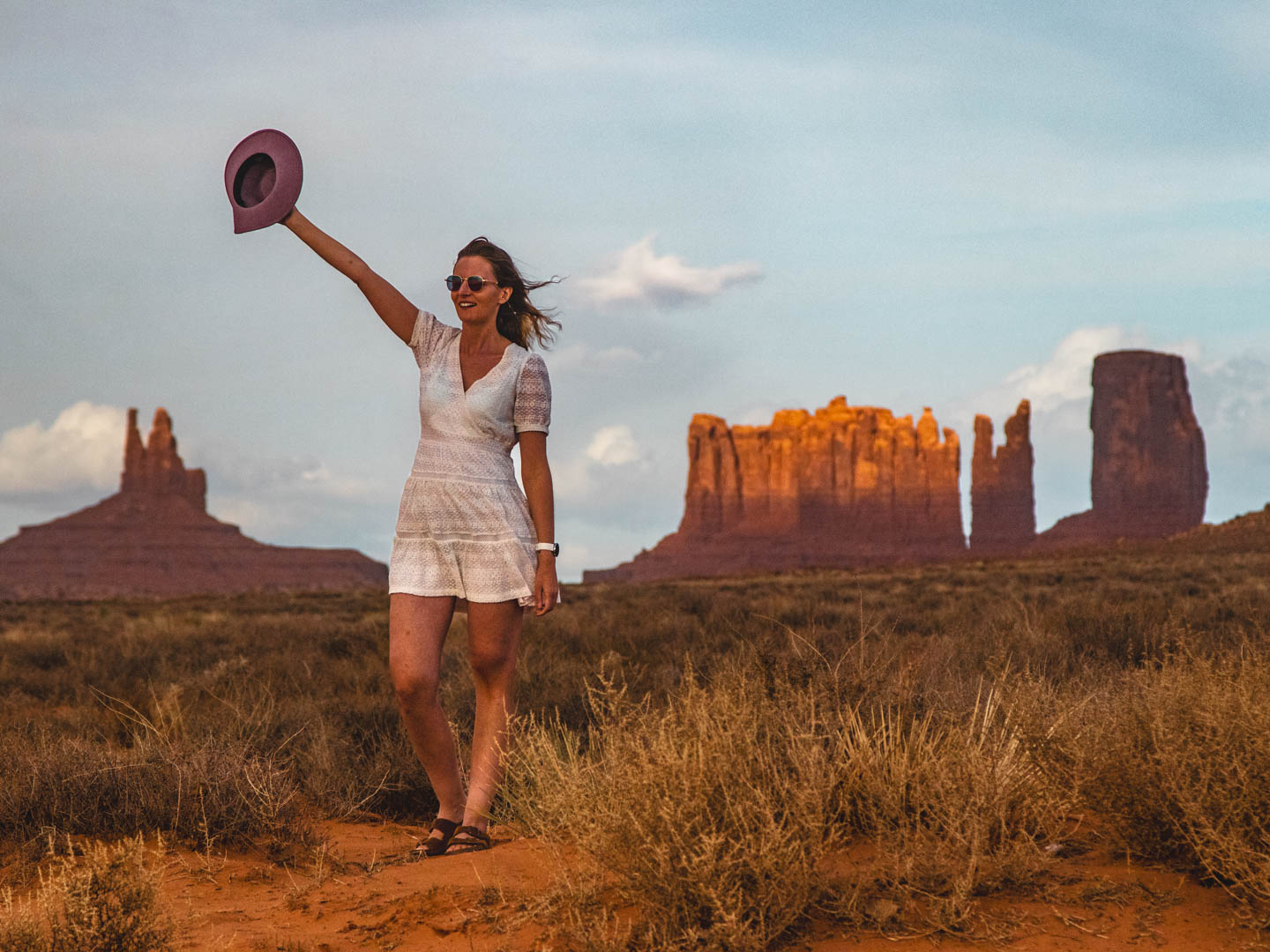
How to Get to Monument Valley
Monument Valley lies in isolation, right on the Arizona-Utah border, so the best way to get here is by car.
You don’t need a big SUV – a large sedan or mid-size SUV that handles longer routes well is sufficient.
This place fits perfectly into a bigger Southwest road trip. Monument Valley connects ideally with other red wonders of the region – from Bryce Canyon’s dramatic formations to Sedona’s spectacular trails in Arizona.
If you’re planning a comprehensive Utah tour, check out my 7-day Utah itinerary, which shows how to connect all the major parks.
Here’s how far it is from nearby places:
- Page, Arizona: ~125 miles (2 hours)
- Flagstaff, Arizona: ~186 miles (3 hours)
- Grand Canyon: ~186 miles (3 hours)
- Phoenix, Arizona: ~311 miles (5 hours)
- Salt Lake City, Utah: ~373 miles (6 hours)
- Las Vegas, Nevada: ~404 miles (6+ hours)
Most people come here from Page, choosing route US-98 E → US-163 N – short, convenient, with fabulous views along the way.
Worth knowing:
Gas stations are rare in this region, so fill up beforehand and have water supplies in your car – especially in summer.
Since Monument Valley lies on Navajo Nation territory, a different time zone operates here than in Arizona (Navajo observes time change).
It’s good to check this if you’re planning sunrise or a guided tour.
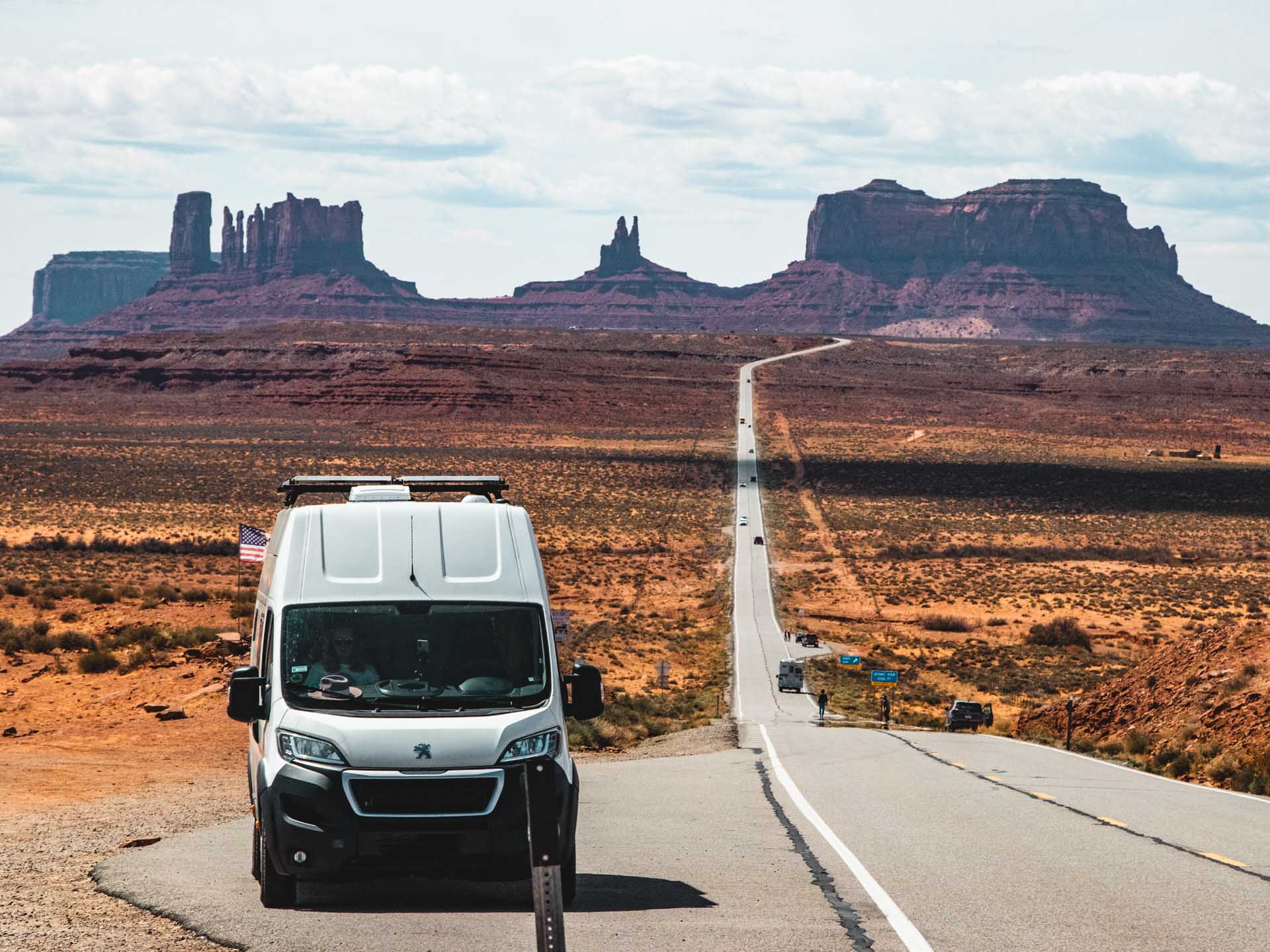
Where to Stay in Monument Valley
A night in Monument Valley is more than just lodging.
It’s a moment when the valley quiets, lights go out, and you have before you one of the darkest and most beautiful skies in the entire Southwest.
If you’re planning to stay longer, here are the best places:
- The View Hotel
The only hotel located directly in Monument Valley Navajo Tribal Park. Every room has a balcony with a view of The Mittens, so you watch sunrise… from bed. This is the most iconic option, sells out quickly. - Goulding’s Lodge
Historic place right at the park border, with views of red rocks and comfortable rooms. You can choose from the lodge, small cabins, and camping. It’s a great base if you want a bit more amenities and a store on site. - Camping in Monument Valley Navajo Tribal Park
Minimalist, simple, but standing in the best-paid spot in the world: with a valley view at any time of day or night. If you love desert silence, here you’ll feel the true atmosphere of Monument Valley. - Private campgrounds – Arrowhead Campground
Located literally a few minutes from the Scenic Drive entrance. Quiet, well-maintained place with beautiful valley panorama. Great option for those who want to be close to nature but prefer more comfortable conditions than in the park.
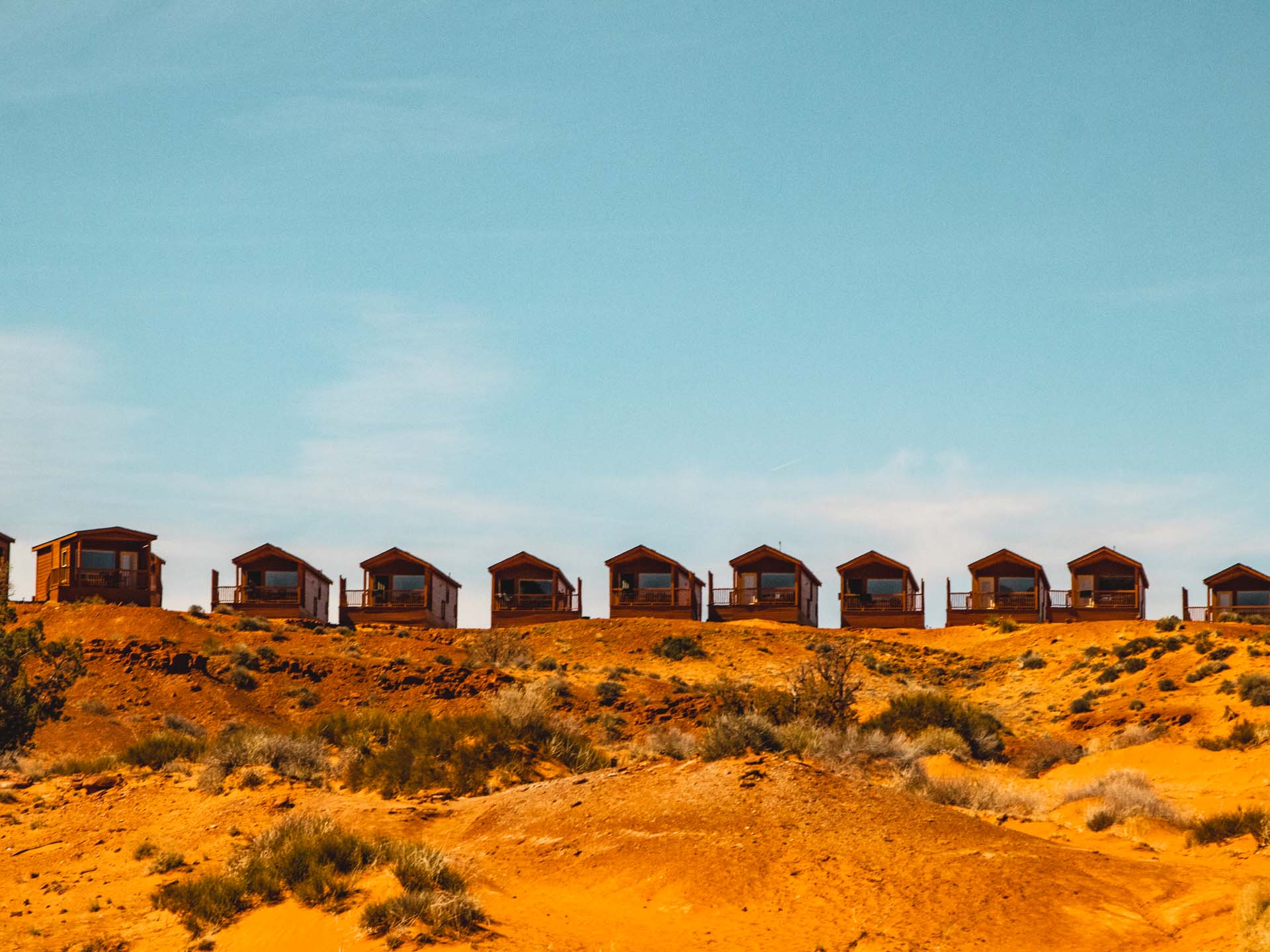
If you prefer to stay outside the valley itself, also check hotels in nearby towns:
- Kayenta, Arizona (24 miles south of Monument Valley) – the nearest “base town” with more hotels and restaurants.
- Hampton Inn Kayenta Monument Valley: Comfortable hotel with a pool and free breakfast. Rates start around $180 per night.
- Wetherill Inn: Simple and affordable, offering cozy accommodations. Rates start around $120 per night.
- Bluff, Utah (50 miles north of Monument Valley) – town with character, beautifully situated among red rocks.
- Willow Street Cottages: Charming, fully-equipped cottages offering privacy. Rates start around $150 per night.
- Bluff Gardens: Relaxing property with a beautiful garden setting. Rates start around $140 per night.
- Monticello, Utah (93 miles north of Monument Valley) – good choice if you’re combining Monument Valley with Arches or Canyonlands.
- The Atomic Blue Motor-Inn: Stylish motel with comfortable rooms and convenient access to attractions. Rates start around $110 per night.
- Inn at the Canyons: Cozy hotel offering comfortable rooms and breakfast included. Rates start around $130 per night.
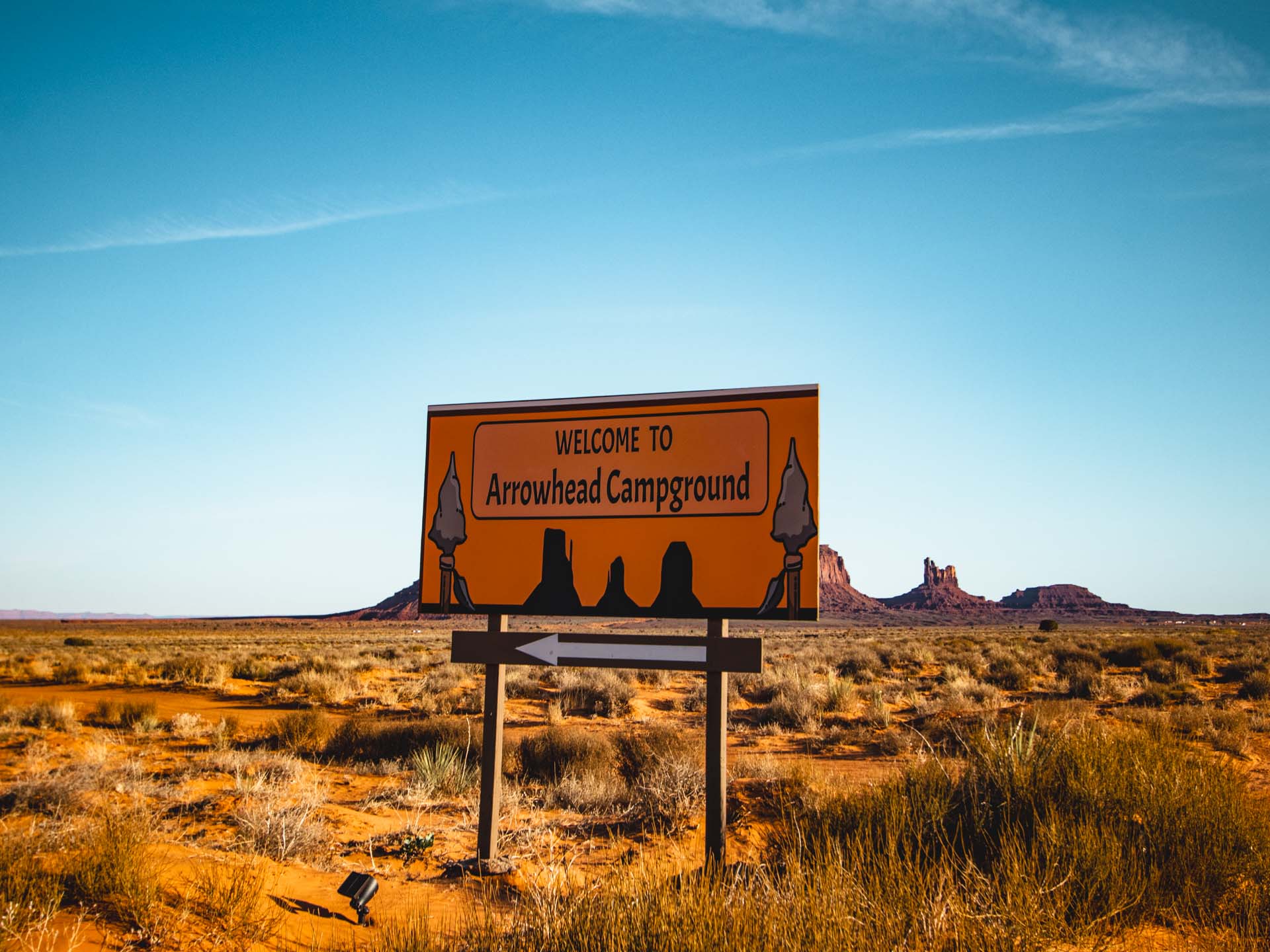
Entrance Fees and Hours
Entry to Monument Valley Navajo Tribal Park costs $8 per person (not per car, like in national parks). It’s a one-time fee collected at park entrance.
Opening Hours:
- Summer (May 1 – September 30): 6:00 AM – 8:00 PM, daily
- Off-season (October 1 – April 30): 8:00 AM – 5:00 PM, daily
Scenic Drive Hours:
- Winter: 8:00 AM – 5:00 PM, daily. Last entry at 2:30 PM.
- Summer: 7:00 AM – 7:00 PM, daily. Last entry at 4:30 PM.
Worth knowing
Monument Valley is closed during the most important Navajo holidays and during sudden weather conditions (strong storms, flash floods).
Information about schedule changes usually appears on the park’s profile and tribal pages.
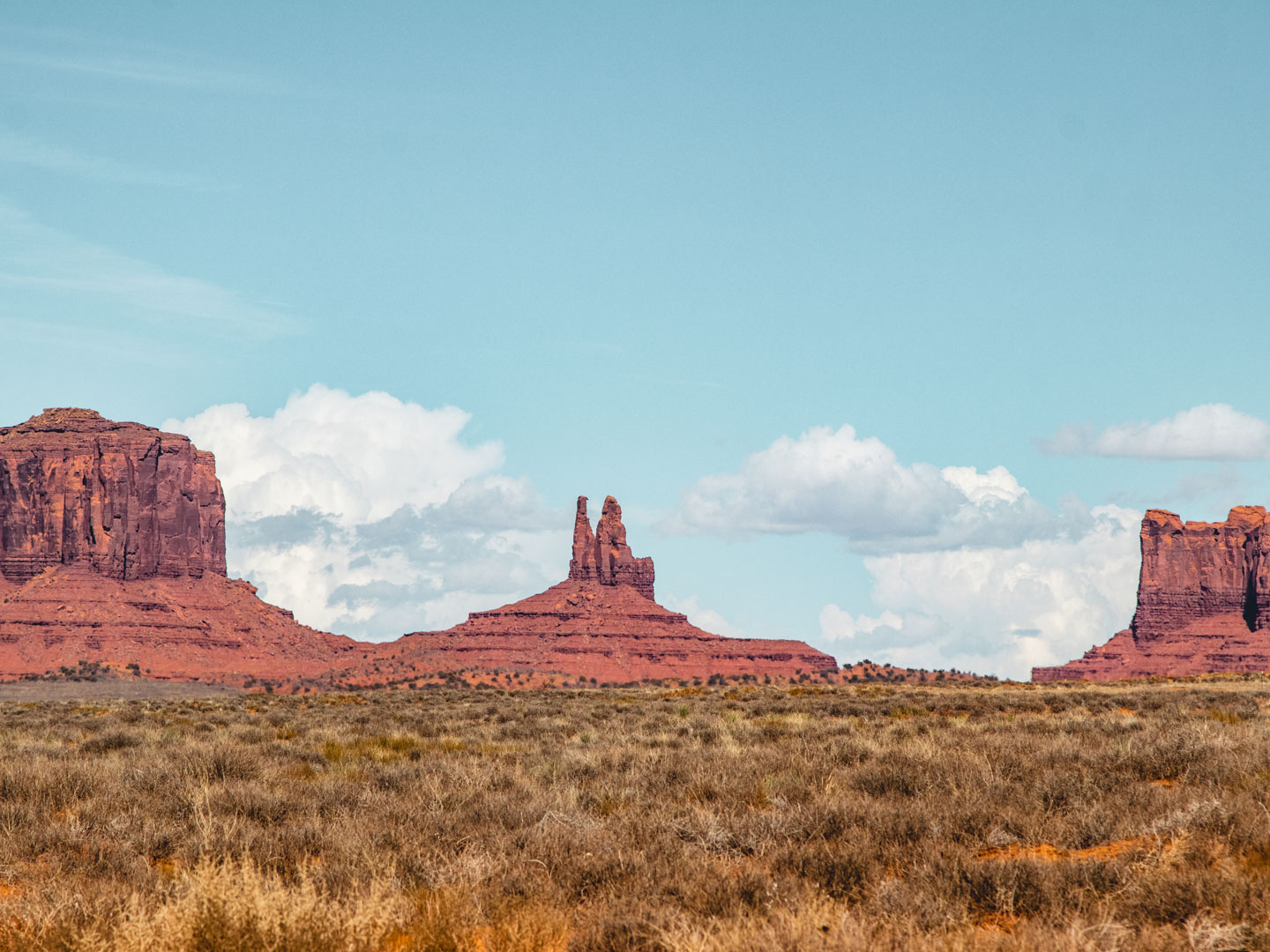
What to Pack for Monument Valley
Monument Valley can be capricious – hot day, cold evening, wind, dry air, and absolutely magical light. It’s worth having a few things with you that will make your trip comfortable and safe.
- Clothing: Layers are key! Days can be hot, and nights chilly. Pack:
- Lightweight, breathable clothes for the day
- A warm jacket or fleece for the evening
- Comfortable hiking shoes
- Wide–brimmed hat
- Sunglasses
- Gear:
- Camera or smartphone with a good camera
- Tripod for nighttime photography
- Power bank (there’s no electricity at the campsites)
- Binoculars for observing distant rock formations
- Food and Water:
- Water bottle
- High–energy snacks
- Thermos for hot drinks, especially if you’re planning to watch the sunrise
- Own food if staying overnight
- Other Essentials:
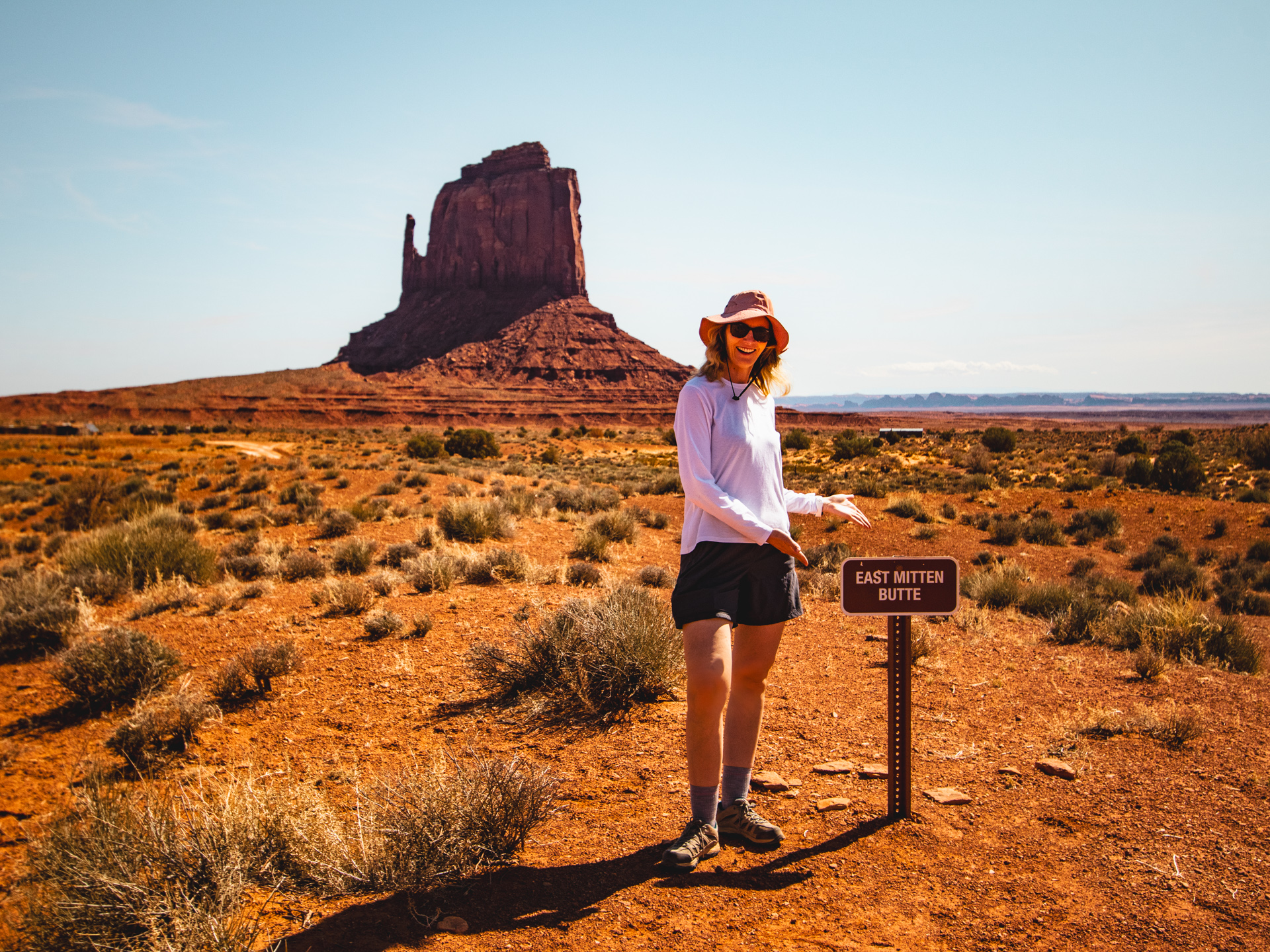
Other Tips
- Respect the land and culture.
Monument Valley is a sacred place for the Navajo. Stay on designated paths, don’t enter areas marked as closed, and always ask permission if you want to photograph someone. - Stay overnight if you can.
Sunset, sunrise, and night sky over the valley are three different worlds. Seen in one day, they create one of the most beautiful “light loops” in the entire Southwest. - Check road conditions.
After rain, dirt roads can be slippery, and after snow – impassable. Before you set out, make sure the route is open. - Bring some cash.
Not everywhere on the reservation has card terminals. Cash is especially useful at small Navajo stands. - Respect ceremony and prayer sites.
If you see a “Sacred Area – No Entry” sign, stop and view the place from a distance. It’s an important gesture of respect. - Follow Leave No Trace principles.
Don’t leave trash, don’t collect sand or stones, don’t step on delicate desert plants. - Watch for wildlife.
Snakes, coyotes, or scorpions may appear in the area. Always watch where you step, especially in summer and at dusk.
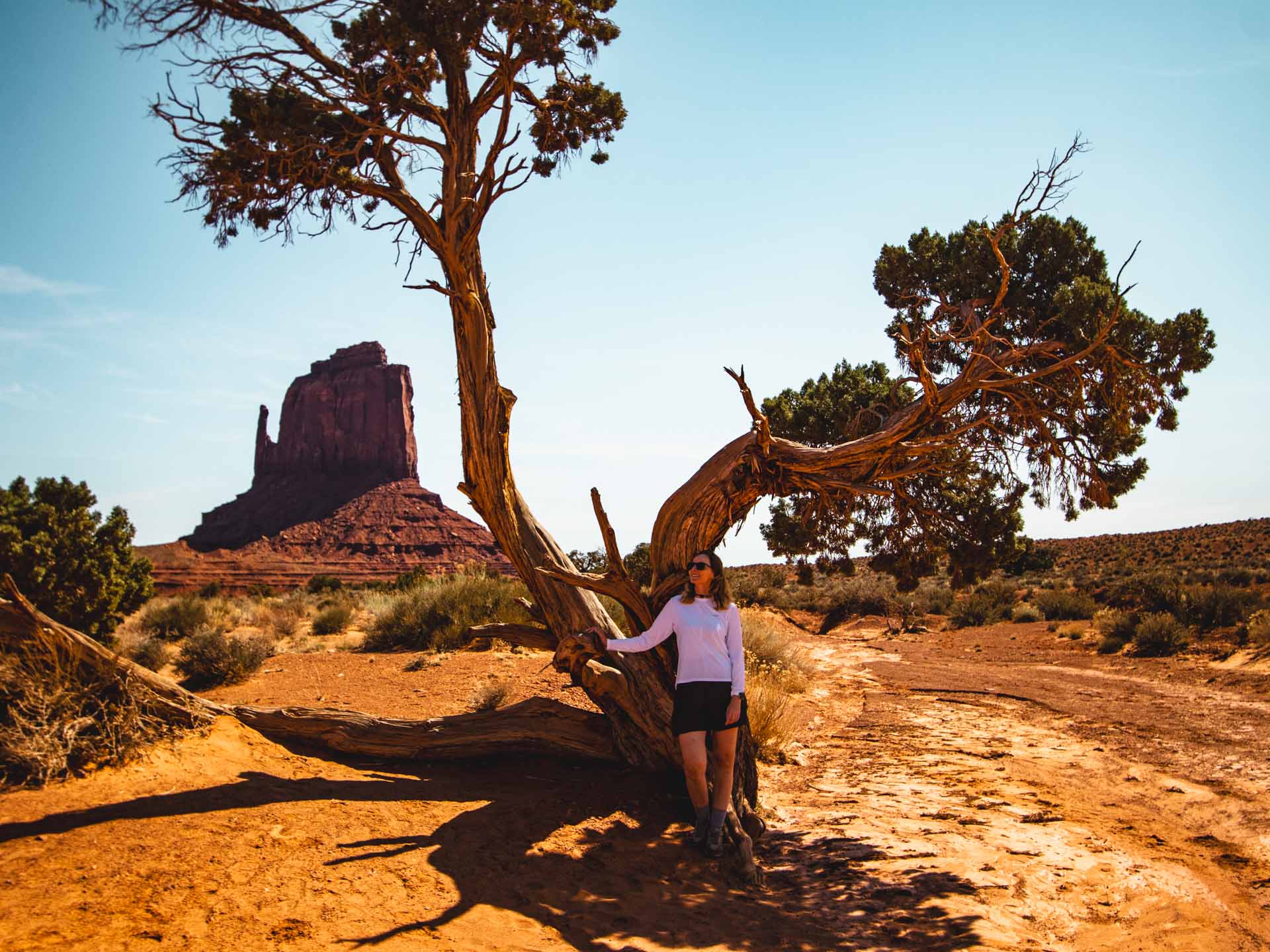
How do you want to continue your American adventure?
🏞️ National Parks Adventure → 10 Amazing Things to Do in Yosemite – My personal tested hiking trails and photography spots
🌊 Pacific Coast Highway → 7-Day California Coast Itinerary – Every scenic stop and hidden beach I discovered
🌲 Pacific Northwest Explorer → 10-Day Oregon & Washington Guide – Waterfalls, forests, and coastal magic
🏜️ Southwest Desert Experience → Arizona Road Trip – From red rocks to slot canyons
What type of American adventure calls to you most?
Monument Valley: Fun Facts That Add Magic to This Place
- Monument Valley is a landscape sculpted over millions of years.
Rock formations were created through erosion – wind, monsoon storms, and water that cut through desert layers of sandstone for hundreds of millions of years. - The oldest rocks in the valley are up to 250 million years old.
They come from the Permian and Triassic periods. Looking at these formations, you’re looking at a piece of Earth’s history that remembers the age of dinosaurs. - Monument Valley has its cinematic DNA.
Iconic scenes from John Ford’s westerns were filmed here, as well as fragments of “Easy Rider,” “Back to the Future III,” and the series “Westworld.” No wonder many people have the feeling they’ve “seen this before.” - In the Navajo language, the valley has a poetic name.
Tsé Biiʼ Ndzisgaii means “valley of rocks.” Simple, beautiful, very Navajo style. - It’s one of the best places in the USA for stargazing.
The sky here is exceptionally dark, almost free from light pollution. In summer you can see the entire Milky Way as clear as day. - Many Navajo families still live within Monument Valley.
Often without access to electricity and running water – in harmony with tradition and the rhythm of the place.
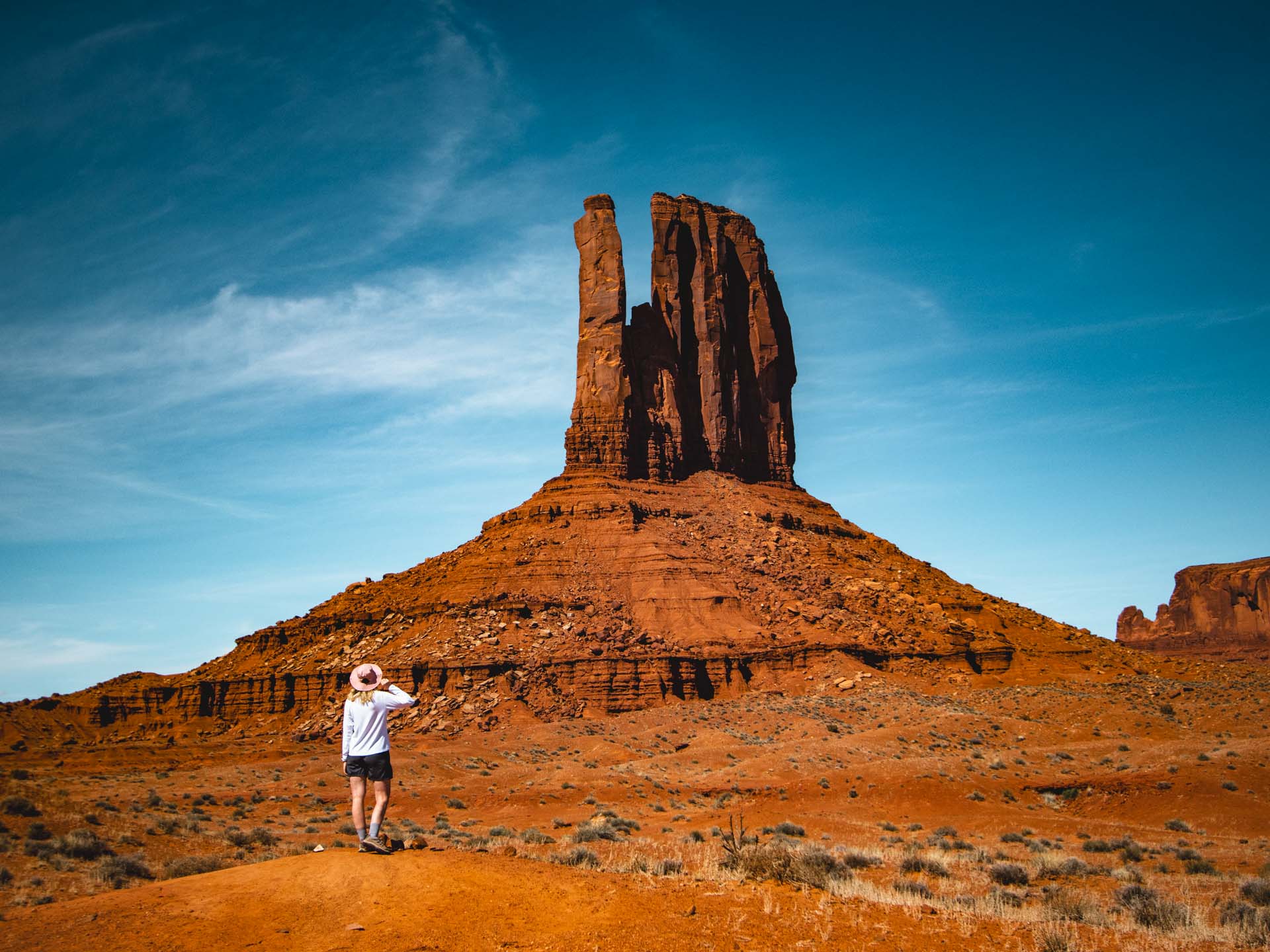
Travel lighter, even before you leave.
start with something simple.
Download The Minimum Plan – Slow Travel:
Monument Valley: A Place That Stays With You
When I first saw Monument Valley – those monumental red spires rising from the flat desert – I had the feeling I’d entered another world. But what really captivated me wasn’t the views.
It was the silence. That kind of silence that lets you hear your own thoughts and feel something greater than yourself.
Monument Valley is one of those places that doesn’t just make an impression – it changes perspective.
Here you begin to understand that traveling isn’t just about checking locations off a list. It’s about experiencing space, listening to its history, and respecting people for whom this land has been home for generations.
If you’ve ever wanted to see something real – without filters, without idealization, simply beautiful and authentic – go to Monument Valley.
Go in the morning, stay until sunset, and if you can – stay overnight. Because that’s when you’ll feel why this place can’t be confused with anything else.
Related USA Guides You’ll Find Helpful
What stuck with you most during your Monument Valley visit? Or are you still planning the trip?
If this guide was helpful, send it to someone else who dreams of red desert underfoot and stars within arm’s reach. This might be exactly the moment that pushed someone to take action.
This article contains affiliate links. If you make a booking through these links, I may earn a commission, supporting this blog. Rest assured, my recommendations are based on honest assessments, and using these links doesn't affect prices for you. Thank you for your support!
